Raising sail on the schooner Olad, playing tennis, snowshoeing in the Maine woods, skiing at the Camden Snow Bowl, performing our own special version of Men in Black, reciting a poem by the famous Camden poet Edna St. Vincent Millay — you can see clips of Acadia Center students up to all these tricks and more on Acadia Center’s new YouTube channel. Check it out, leave your comments, and subscribe so you don’t miss the next installments!

Acadia English Blog
New Immersion Course Packages, New Discounts
 Acadia Center has added more features to its most popular course packages, giving more value to you and making it easier to plan your immersion course in Maine. The packages for both our combination (private/mini-group) courses and our private courses now include the following features:
Acadia Center has added more features to its most popular course packages, giving more value to you and making it easier to plan your immersion course in Maine. The packages for both our combination (private/mini-group) courses and our private courses now include the following features:
- 16 hours per week of English lessons
- weekly individual 30-minute meeting with a teacher to assess your progress and objectives
- 11 hours per week of guided study in the study center
- all books and materials
- 2 afternoon teacher-led excursions per week (Tuesday & Friday) including all admission/activity fees and transportation
- accommodation in a comfortable private room at Acadia Center or in a village home near Acadia Center

- lunch and dinner with teachers at Acadia Center (Monday through Friday)
- breakfast (self-serve) every day
- free high-speed wireless Internet access
- course certificate
- free admission to indoor swimming pool, gym, indoor track, and fitness center
- transportation between Rockland (Maine) or Portland (Maine) airport and Acadia Center on the first and last days of your course
In short, everything you need to raise your English to a higher level and make your stay with us relaxing, comfortable, and fun.
Three new discounts are also now available, and they can all be combined:
Early Registration Discount: Take 5% off the package price when you register and pay the deposit 10 weeks or more in advance of your course starting date.
Friends/Couple Discount: Take 5% off the package price if you attend a course with your spouse or a friend or colleague.
Alumni Discount: Take 5% discount off the package price if you previously attended an immersion course at Acadia Center.
See our course prices page for complete details. New courses begin every week, so you can start your course on a date that is convenient for you. To get the largest possible discount, plan ahead and book your immersion course now using our online Registration Form. If you have questions, contact us!
Artist Paints Portraits of Acadia Center Students
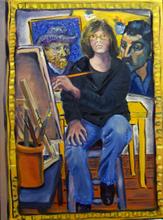 Artist Albie Davis has recently exhibited several portraits of Acadia Center students she and her partner John Chandler have hosted in their Thomaston, Maine, home.
Artist Albie Davis has recently exhibited several portraits of Acadia Center students she and her partner John Chandler have hosted in their Thomaston, Maine, home.
Albie writes that in her art she tries many different forms and materials, but she is “always coming back to portraits, whether of humans, other animals, houses, cars, you name it. Making art is an excuse to explore the universe, to make sense of it all, and, if inclined, to reveal its nonsense! When I first read T. S. Eliot’s observation, ‘We shall not cease from exploration, and the end of all our exploring will be to arrive where we started and know the place for the first time,’ I thought of how each cycle of observation reveals something new about the familiar.”
whether of humans, other animals, houses, cars, you name it. Making art is an excuse to explore the universe, to make sense of it all, and, if inclined, to reveal its nonsense! When I first read T. S. Eliot’s observation, ‘We shall not cease from exploration, and the end of all our exploring will be to arrive where we started and know the place for the first time,’ I thought of how each cycle of observation reveals something new about the familiar.”
Albie’s painting of Fernando, an executive from Spain living in Brazil, was her first portrait of an Acadia Center student. Fernando has attended English immersion courses at Acadia Center three times over the last six years and has stayed with Albie and John each time.
 The subjects of the next Acadia Center portraits were Daeene, an IT professional from Brazil who posed while reading a book, and Martine, a banking executive from Québec who shares the canvas with Albie and John’s dog Gromit.
The subjects of the next Acadia Center portraits were Daeene, an IT professional from Brazil who posed while reading a book, and Martine, a banking executive from Québec who shares the canvas with Albie and John’s dog Gromit.
 Acadia Center students love staying with Albie and John and many have kept in touch with them over the years. Martine recently drove from Québec to see the premiere of Lighthouse, a muscial set in 1930’s Maine for which John wrote the libretto.
Acadia Center students love staying with Albie and John and many have kept in touch with them over the years. Martine recently drove from Québec to see the premiere of Lighthouse, a muscial set in 1930’s Maine for which John wrote the libretto.
Albie shows her paintings regularly in midcoast Maine. We’ll keep you informed of her exhibits!
Try an Online Lesson for Free
Since the launching of the new program last fall, our online English conversation lessons have become very popular. Convenient, affordable, and very effective, our online classes can help you improve the two skills that most English learners feel are their weakest points: speaking and comprehension.
All you need is a telephone (landline, mobile, or internet phone) and a computer with an Internet connection. We call you at a pre-arranged time. At regular intervals during our conversation and using a screen-sharing tool via the internet as a virtual blackboard, we provide you with clear, detailed suggestions on improving your English vocabulary, grammar, and pronunciation.
At the end of the lesson, we e-mail you study notes on the vocabulary and main language points discussed during the lesson.
Now you can try this new program for free: register using our online form and note in the comments line that you are applying for a free introductory lesson. The first three English learners who respond to this offer will each receive a free 30-minute online English conversation lesson (a $30 value). Please note that this offer is available to students with at least a lower-intermediate level of English.
We look forward to helping you improve your English conversation skills!
Film Notes: Invictus
 The second in a series, this article provides a preview of a movie you might like to see along with a vocabulary lesson for intermediate to advanced English learners. The selected vocabulary words are in bold and followed by succinct definitions. Sherlock Holmes was the previous article in the series – check back soon for the next.
The second in a series, this article provides a preview of a movie you might like to see along with a vocabulary lesson for intermediate to advanced English learners. The selected vocabulary words are in bold and followed by succinct definitions. Sherlock Holmes was the previous article in the series – check back soon for the next.
Clint Eastwood’s new film Invictus tells the story of Nelson Mandela’s first days as president of post-apartheid South Africa in 1994. Morgan Freeman’s moving (evoking strong feelings) portrayal of Mandela’s gentle humor, elegant, old-fashioned courtesy, and fierce intelligence makes for a fascinating (very interesting) behind-the-scenes (theater metaphor: occuring backstage or out of the view of the general public) look at the birth of a new era.
Freeman’s Mandela is continually surprising his advisors and security personnel with his indefatigability (never getting tired) – as he charges out of his house for his pre-dawn (before sunrise) constitutionals (walking for exercise) at the beginning of marathon workdays – as well as with his emphasis on reconciliation (making harmony with your opponents or enemies) rather than recrimination in dealing with white South Africans.
 In this spirit, Mandela makes the surprising decision to throw his whole-hearted (full, passionate) support behind the Springboks, the nearly all-white national rugby team that had become a hated symbol of oppression to most black South Africans. And so begins a remarkable turnaround (reversal of fortunes) for a team that seemed destined to make a poor showing as hosts of the 1995 Rugby World Cup.
In this spirit, Mandela makes the surprising decision to throw his whole-hearted (full, passionate) support behind the Springboks, the nearly all-white national rugby team that had become a hated symbol of oppression to most black South Africans. And so begins a remarkable turnaround (reversal of fortunes) for a team that seemed destined to make a poor showing as hosts of the 1995 Rugby World Cup.
If you’re watching the film to practice your English, Freeman’s stately (majestic), measured eloquence as Mandela will give you a sporting (good enough) chance to understand the vocabulary the first time around.
Matt Damon as the Springboks’ captain Francois Pienaar is also not too difficult to understand as he echoes the calm, thoughtful, resilient (able to recover from adversity) tone of Mandela.
 The grunting exertions of the rugby scenes are not so lengthy that they risk boring non-sports fans, and the underdog (not expected to win) status of the Springboks makes for stirring drama as their startling (very surprising) success is celebrated with boyish enthusiasm by Mandela.
The grunting exertions of the rugby scenes are not so lengthy that they risk boring non-sports fans, and the underdog (not expected to win) status of the Springboks makes for stirring drama as their startling (very surprising) success is celebrated with boyish enthusiasm by Mandela.
In a quietly moving scene Damon’s character and the Springboks team visit the tiny (very small) Robben Island prison cell where Mandela spent 18 of his 27 years as a political prisoner. The song 9,000 Days, the title of which refers to the length of time Mandela spent in prison, by the South African group Overtone with Yollande Nortjie, is featured in the soundtrack (the music in the film).
The title of the film – Latin for unconquered – is drawn from a poem by the 19th century poet William Ernest Henley that in the film Mandela gives to the Springboks’ captain for inspiration. In reality, Mandela did find inspiration in the poem while in prison but instead gave the Springboks’ captain a passage from a 1910 speech called The Man in the Arena by US president Teddy Roosevelt.
Invictus
Out of the night that covers me,
Black as the pit from pole to pole,
I thank whatever gods may be
For my unconquerable soul.
In the fell clutch of circumstance
I have not winced nor cried aloud.
Under the bludgeonings of chance
My head is bloody, but unbowed.
Beyond this place of wrath and tears
Looms but the Horror of the shade,
And yet the menace of the years
Finds and shall find me unafraid.
It matters not how strait the gate,
How charged with punishments the scroll,
I am the master of my fate:
I am the captain of my soul.
Vocabulary from the poem:
fell (dreadful, cruel)
clutch (strong hold, grip)
winced (flinch, draw back from fear of pain)
bludgeonings (heavy blows or hits)
unbowed (not lowered)
wrath (anger)
looms (action to describe the taking shape of an impending event or the coming closer of something of impressive size)
menace (danger, threat)
strait (narrow – not the same as straight, which means without bend or curve)
scroll (list or roster)
If you see the film, let us know what you think of it!
Acadia Center Alumni T-Shirt Contest
 Announcing Acadia Center’s first-ever alumni T-shirt contest!
Announcing Acadia Center’s first-ever alumni T-shirt contest!
Send us a photo (by e-mail) of yourself wearing your Acadia Center T-shirt and try to win one of our contest prizes.
Contest rules:
1. The T-shirt must have the authentic Acadia Center logo (not the cheap replicas you find in Times Square).
2. You have to be wearing the T-shirt.
3. The photo must have been taken outside of Maine – either where you live or somewhere you have visited in your travels.
Contest deadline:
March 15, 2010
Contest prizes:
The three winners will each receive his or her choice of either: a free 30-minute online English conversation lesson (value $30) or a $30 discount to an English immersion course at Acadia Center. Prizes must be redeemed by June 1, 2010.
How to Learn Phrasal Verbs
Students of English often complain about the difficulty of learning phrasal verbs. Simply put, a phrasal verb is a combination of a verb (an action word like look, take, set) and a preposition (a short connecting word like up, out, over) in which the preposition gives the verb a new meaning. In this sense, we can say that the meaning is idiomatic – in other words the phrase can’t be translated word by word but only by looking at the phrase as a whole.
Sometimes verb + preposition combinations are not idiomatic, as in the phrase listen to. To is simply the preposition that’s required after the 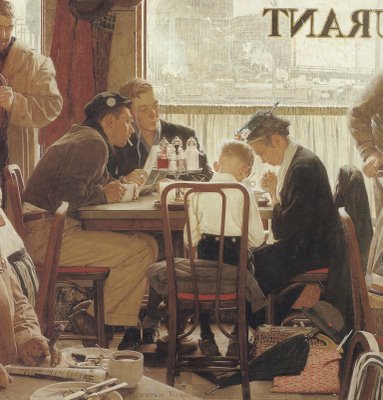 verb listen if you want to say what it is you’re listening to, as in: She’s listening to the radio.
verb listen if you want to say what it is you’re listening to, as in: She’s listening to the radio.
Sometimes a single phrasal verb can have both a literal, non-idiomatic meaning and one or more idiomatic or figurative meanings. For example, if you want to see the moon you have to look up at the sky. The word up here is used as a kind of adverb (adverb particle is the 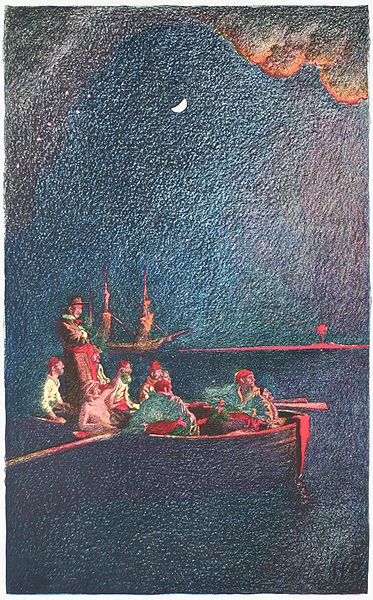 tehnical term) and it doesn’t really change the meaning of the verb look — it just tells us the direction you’re looking.
tehnical term) and it doesn’t really change the meaning of the verb look — it just tells us the direction you’re looking.
However, when you don’t know the meaning of a word and you look up the word in a dictionary, there’s nothing directional about the word up. Look in this phrase still means use your eyes, but the meaning of the phrase as a whole has a very specific focus – searching for information in a reference book or online.
There are some grammatical issues with phrasal verbs – can another word come between the verb and preposition or not? – but learning how to use phrasal verbs is best accomplished the same way that you go about learning any new vocabulary.
How to Learn Phrasal Verbs:
1. Read and listen. When you see or hear a phrasal verb you don’t know, write it down. But don’t just write down the verb and the preposition, copy the whole sentence. Understanding the context – how the phrase is used with the other words in the sentence – is what will make it possible for you to use the phrase yourself in the future.
2. Find out the meaning in that specific context. This is where a teacher or native English speaker can save you time, because there is often more than one meaning for each phrasal verb, but if you’re on your own, look it up in a dictionary and decide which definition fits best in context.
3. Practice it in conversation and/or writing. Get feedback from a teacher or native English speaker about whether or not you’re using it the way native speakers do.
4. Study your list of phrasal verbs and keep adding to the list. If you find a phrasal verb from your list used in a new way, write down the new example.
Why is learning phrasal verbs in context better than learning them from a dictionary or book about phrasal verbs? Four reasons.
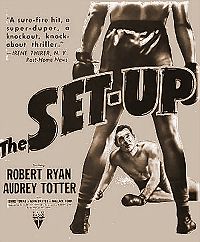 1. You can be sure you’re learning the most common uses of the most common phrasal verbs first. You don’t want to waste your time learning the more obscure uses.
1. You can be sure you’re learning the most common uses of the most common phrasal verbs first. You don’t want to waste your time learning the more obscure uses.
2. They will be easier to remember. Dictionary.com has 15 different phrasal verbs based on the verb set (set in, set off, set out, etc.) and 15 different meanings for just the single phrasal verb set up – and the meanings vary widely. If you try to learn them all together, it’ll be too difficult to remember each separate meaning. Take them one at at time, in context.
3. When you’re learning phrasal verbs in context, through reading and listening, you’re learning a lot of other things about English as well, including other vocabulary words and grammatical structures.
4. It’s much more interesting to learn from stories and conversation than from printed lists. And the fact that you’re interested in the context will make it much easier to remember the phrasal verb later.
If you have any questions about the meaning of specific phrasal verbs, or if you have your own tips on how to learn phrasal verbs, leave a comment here!
Great Food, Great Conversation
Fresh local seafood, fruit, and vegetables, delicious meat and pasta dishes, healthy salads and freshly baked whole grain breads, luxurious desserts — it’s all on the menu at Acadia Center.
Sample lunch & dinner menu:
Monday
lunch: spinach and ricotta manicotta with garden salad
dinner: steak with sauteed greens & rolls
Tuesday
lunch: chicken pot pies with garden salad
dinner: fresh scallops with steamed rice and sauteed green beans
Wednesday
lunch: quiche with garden salad
dinner: pork tenderloin with mashed potatoes
Thursday
lunch: tarragon chicken salad
dinner: fresh salmon served with roasted vegetables
Friday
lunch: rustic Italian pasta salad
dinner: beef kabobs served with rice pilaf
Lunches and dinners Monday through Friday are included in the immersion course package. The family-style meals give students the chance to practice their English with teachers and other native-English-speaking guests in a relaxed and friendly atmosphere.
Comments from recent students on meals at Acadia Center:
Excellent: I ate a lot but I didn’t gain weight. Every meal was delicious and nutritious. – Gerard, IT professional, Venezuela
Well-balanced and diverse. – Jean-Marc, international trade agent, France
 Delicious and fun – I had the opportunity to speak about many topics and in this way I was able to improve my speaking ability. – Maria, IT executive, Venezuela
Delicious and fun – I had the opportunity to speak about many topics and in this way I was able to improve my speaking ability. – Maria, IT executive, Venezuela
I ate very well every day. The meals were all delicious! – Diane, retired nurse, Quebec
The food was very good: fresh and full of variety. – Rodolfo, sales executive, Italy
Farm photo by Marti Stone.
Film Notes: Sherlock Holmes
 Film Director Guy Ritchie’s new take on the iconic 19th-century English detective Sherlock Holmes was released on Christmas Day in the USA. While preserving some of the brooding (preoccupied with morbid thoughts) aloofness (emotional distance, reserve) and bohemian (unconventional, anti-establishment) eccentricities of the character as seen in earlier film versions dating back to the Basil Rathbone series of the 1940’s, this new version of Sherlock Holmes, starring Robert Downey Jr., presents us with a scrappier, funnier, and more vulnerable mastermind.
Film Director Guy Ritchie’s new take on the iconic 19th-century English detective Sherlock Holmes was released on Christmas Day in the USA. While preserving some of the brooding (preoccupied with morbid thoughts) aloofness (emotional distance, reserve) and bohemian (unconventional, anti-establishment) eccentricities of the character as seen in earlier film versions dating back to the Basil Rathbone series of the 1940’s, this new version of Sherlock Holmes, starring Robert Downey Jr., presents us with a scrappier, funnier, and more vulnerable mastermind.
The scrappiness (fighting spirit) comes into play when Holmes shows off (exhibits) his skills as an expert bare-knuckle (no boxing gloves) boxer and inventive street brawler (disorderly, unruly fighter) in several scenes that pit him against (find him confronted by) opponents nearly twice his size. The idea of investing Holmes with boxing prowess (bravery, ability, strength, especially in battle) comes straight from the pen of Sherlock Holmes’s creator, the author, athlete, spiritualist, and amateur detective Sir Arthur Conan Doyle.
The vulnerability (susceptibility to being hurt) is seen in his emotional dependence on his friend Dr. Watson, played by Jude Law, and his confusion when ensnared by the seductive Irene Adler, played by Rachel McAdams.
The humor comes occasionally from the repartee (quick, witty replies) between Holmes and Watson, but more often from the clever and eccentric way that Holmes extricates himself from the most dangerous predicaments, as when he hides himself from his enemy in the smoke of a fireplace and then launches himself out of the window of the Houses of Parliament into the River Thames. The first part of his anatomy that resurfaces is not his head, gasping for air, but his extended right hand  holding the pipe he was anxious to keep dry.
holding the pipe he was anxious to keep dry.
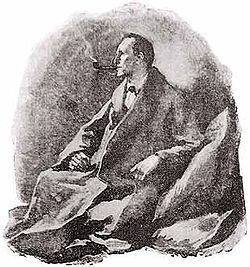 Susan Wloszczynza of USA Today gives us a fascinating backstage look at the making of Sherlock Holmes, describing the conversion of a Brooklyn, NY, armory into a 19th-century English gentleman’s flat and revealing that both Downey and Law pored over (read or studied intently) Doyle’s writings to extract what they dubbed (called) Doyle-isms — characteristic expressions that would lend color and authenticity to the dialogue.
Susan Wloszczynza of USA Today gives us a fascinating backstage look at the making of Sherlock Holmes, describing the conversion of a Brooklyn, NY, armory into a 19th-century English gentleman’s flat and revealing that both Downey and Law pored over (read or studied intently) Doyle’s writings to extract what they dubbed (called) Doyle-isms — characteristic expressions that would lend color and authenticity to the dialogue.
The language of the film, while occasionally formal in tone in keeping with the time period, is fairly straightforward and not too slang-heavy, making it a good choice for upper-intermediate to advanced-level speakers of English.
If you see the movie, leave a comment here telling us what you think!
New Discount for Winter Courses
Take advantage of Acadia Center’s winter course discount and the lower off-season airfares to immerse yourself in English — effectively and affordably – in a beautiful New England town!
Enjoy a personalized learning program, lively lessons focused on your needs, delicious and healthy meals, comfortable accomodations, and total English immersion from morning to night.
You might even like to take advantage of the season by skiing or snowboarding at the Camden Snow Bowl, just a 10-minute drive from Acadia Center. The Snow Bowl offers downhill skiing (with ocean views from the top of the mountain), snowboarding, cross-country skiing, snowshoeing, and tubing — and your lift ticket and equipment rental (and lessons too if you are a beginner) are free during Acadia Center excursions.
If winter sports aren’t your thing, don’t worry — you can stay warm in the cozy shops, cafes, and museums in the area, as well as the nearby fitness center, with its Olympic-sized swimming pool, indoor track, gym, and excercise room — all free for Acadia Center students.
Take 5% off the course fee (not including accommodations) for winter courses. To receive the discount, register and pay the course fee deposit before January 1, 2010, for a course beginning before April 1, 2010. For new registrations only and not for customized courses. Write discount code W5 in the questions/comments line when registering.



